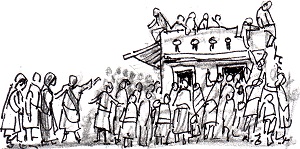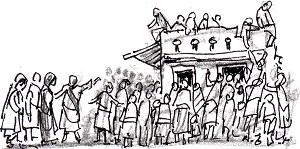

“Who is my mother? Who are my brothers?” (Matt 12:49).
Micah 7:14-15, 18-20; Matt 12:46-50
Many of the scripture passages about Jesus’ relationship with his mother are puzzling. In today’s Gospel from Matthew, Jesus says that his disciples are his family for doing the will of his heavenly father. His mother, brothers and sisters were waiting outside to speak with him, and his discounting of blood relations as the highest loyalty must have been disconcerting to them and a challenge to a culture in which family and tribal membership were sacrosanct.
In another scene, a woman in the crowd cries out, ”Blessed is the womb that bore you and the breasts that suckled you,” only to have Jesus say, “Blessed rather are those who hear the word of God and keep it” (Luke 11: 27). Early in his Gospel, Luke introduces this same theme when the boy Jesus asks his distraught parents why they have been searching for him, “Didn’t you know I had to be in my Father’s house?” (2:49).
In John’s Gospel, when his mother tells him of the wine shortage at the wedding in Cana, he says to her, “Woman, what does this have to do with me?” (2:4). At the end of his life as he hangs on the cross, Jesus again calls his mother “woman” and tells her that the beloved disciple is now her son and she his mother (19:26). These apparent distinctions may in fact be a way of elevating discipleship to the level of intimate family status, but in context, Jesus’ words seem to suggest that obedience to God is superior to any purely natural relationship with him.
Before we take these passages too personally, their theological importance may help to explain the qualitative leap implied in baptismal identity compared with physical identity in the Gospels. A relationship with Jesus is membership in the New Creation and the New Covenant made possible by the Incarnation and the order of grace. We recall Jesus’ praise of John the Baptist as the greatest person ever born, yet the least in the Kingdom of heaven is greater than he” (Matt 11:11). The significance of this distinction was such that the Gospels risked offending our natural sensitivities about family love by preserving these quotes.
Mary’s greatness clearly lies in both her maternal role in the Incarnation of Jesus and in her total devotion to the will of God, which she embraced by becoming the mother of the Word. But she is first and foremost a disciple of Jesus and a model to us of how deep and total this relationship is meant to be. We, in fact, are all invited to do what Mary did to fulfill our baptismal relationship to Jesus.
Mary is one of us. Each time she is elevated from us, we may feel excused from doing what she did. Her feasts are about us. We, too, say yes to God’s Word becoming flesh in us. We carry and give birth to the Word in the world. We discover our intimacy with Jesus by pondering the joys, sorrows and glory of his life, death and resurrection in us.
Ultimately, Mary helps us understand that Jesus is also one of us in every human way possible. In relationship with him we learn how to be human, and this is our path to divine life, the purpose of his Incarnation and life among us. This is discipleship, the life of the baptized, why he calls us his brothers, sisters and mother.
Advertisement







